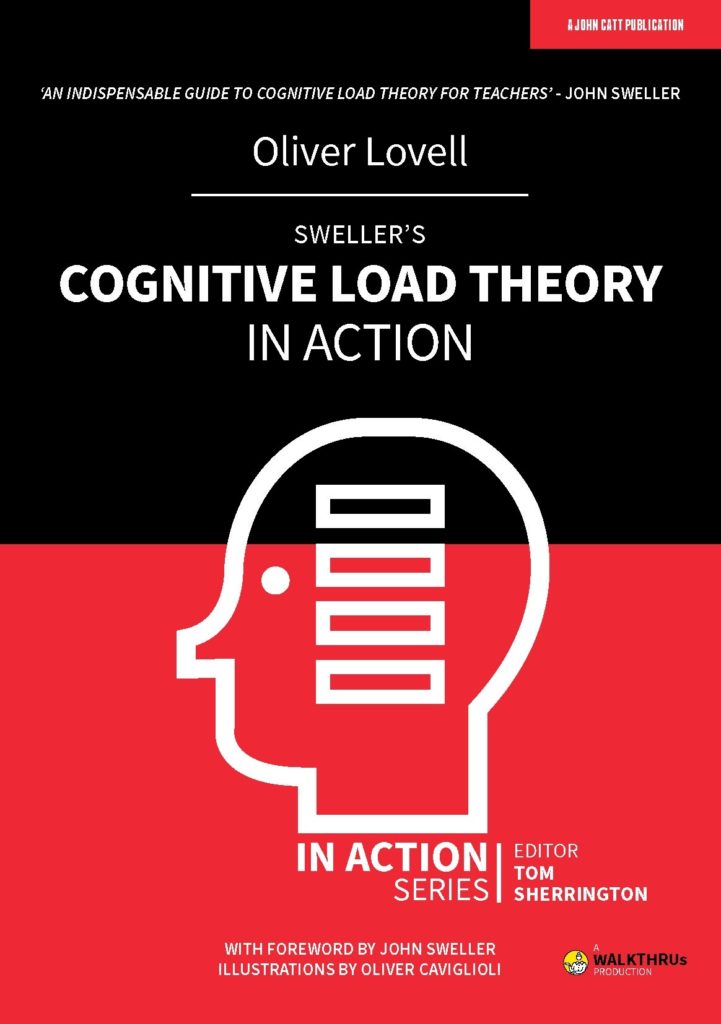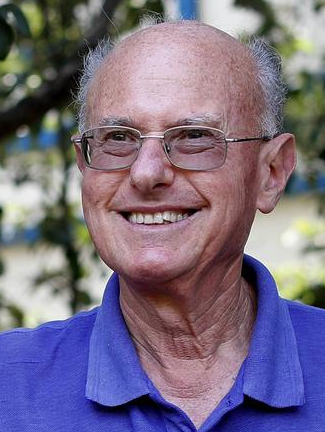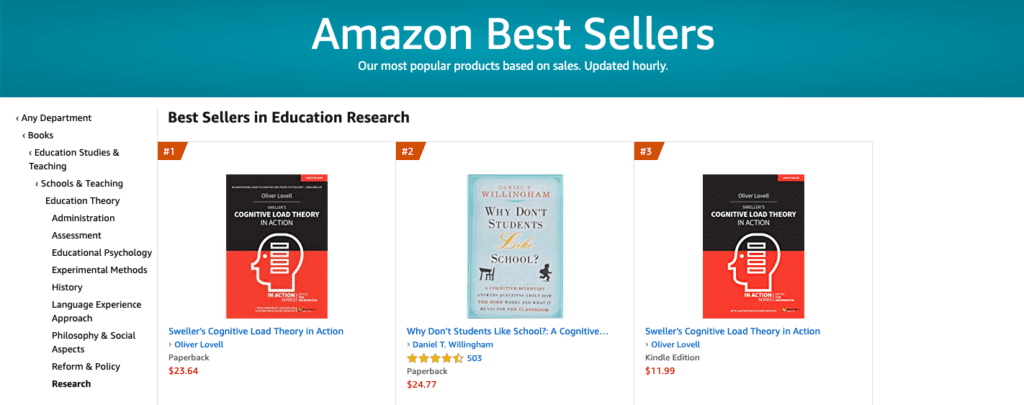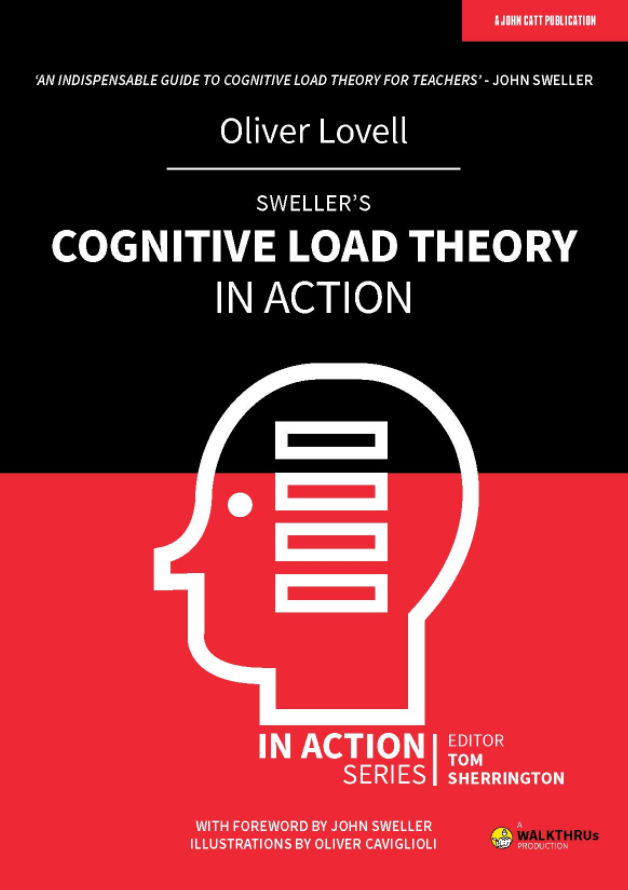
Finally understand what’s going on in their heads when you’re teaching!
What is it that enables students to learn from some classroom activities, yet leaves them totally confused by others? Although we can’t see directly into students’ minds, we do have Cognitive Load Theory, and this is the next best thing. Built on the foundation of all learning, the human memory system, Cognitive Load Theory details the exact actions that teachers can take to maximise student outcomes.


‘I would like to recommend this book in the highest possible terms to all educators who wish to familiarise themselves with cognitive load theory’
– Emeritus Professor John Sweller
Written under the guidance, and thoroughly reviewed by the originator of CLT, John Sweller, this practical guide summarises over 30 years of research in this field into clear and easily understandable terms. This book features both a thorough discussion of the core principles of CLT and a wide array of classroom-ready strategies to apply it to art, music, history, chemistry, PE, mathematics, computer science, economics, biology, and more.


Now an Amazon Bestseller!


‘No matter what age of students you teach, no matter what subjects you teach, you will find lots here of direct relevance to your practice. I don’t often say this, but this is a book that I think every teacher should read.’- Dylan Wiliam



Where can I get the book?
- Australia – Get a signed copy here
- UK – John Catt Publishing UK
- US – John Catt US
- Everywhere else – (See your country’s Amazon store)


‘Lovell’s tour de force on cognitive load returns the depth of science to this often misused concept, provides clear and worthwhile implications for teaching and learning, and has a clarity of writing that is exceptional. One of the best books I have bought and read for a long time. ‘- John Hattie
What John Sweller says about Cognitive Load Theory in Action
I first met Oliver Lovell, who is a high school teacher, several years ago. He asked to interview me for publication on his blog. I receive far more such requests than I possibly can accommodate but he was unusual in that he seemed to have a considerable familiarity with the cognitive load theory literature. I readily acceded to his request and even more readily agreed to provide him with feedback on the subsequent cognitive load theory book he intended to write. That book, which you now are reading, was intended for practitioners, unlike the research literature.
Oliver Lovell is not just familiar with cognitive load theory, he is a brilliant writer with a skill in distilling complex concepts into readily intelligible prose. I wish I could write as well as he writes. Accordingly, I would like to recommend this book in the highest possible terms to all educators who wish to familiarise themselves with cognitive load theory. – John Sweller, July 2020
Overview
What is it that enables students to learn from some classroom activities, yet leaves them totally confused by others?
Although we can’t see directly into students’ minds, we do have Cognitive Load Theory, and this is the next best thing. Built on the foundation of all learning, the human memory system, Cognitive Load Theory details the exact actions that teachers can take to maximise student outcomes.
Written under the guidance, and thoroughly reviewed by the originator of CLT, John Sweller, this practical guide summarises over 30 years of research in this field into clear and easily understandable terms. This book features both a thorough discussion of the core principles of CLT and a wide array of classroom-ready strategies to apply it to art, music, history, chemistry, PE, mathematics, computer science, economics, biology, and more.
The background to this book
It was some time around the end of January 2017 that, scrolling through my Twitter feed, I came across the following bold claim:
I’ve come to the conclusion that Sweller’s Cognitive Load Theory is the single most important thing for teachers to know
– Dylan Wiliam
When Dylan Wiliam tweets, teachers pay attention, and I was no exception. In the months following, prompted by this tweet and an exponentially growing interest, I voraciously devoured all I could get my hands on in relation to Cognitive Load Theory. I wrestled with the seminal text on the subject, Sweller, Ayres and Kalyuga’s Cognitive Load Theory. I read Sweller’s Story of a Research Program, in which he outlines the origins of the theory and its subsequent development. I read blogs, listened to podcasts, read academic papers and finally, in July of that year, I took a flight to Sydney to interview the man himself, John Sweller.
Through all of this exploration, and once I’d managed to peel back the layers of academic terminology in which the core ideas seemed to be encased, I realised that what lay beneath was an incredibly rich and powerful model that would come to fundamentally change the way I saw my teaching, and my students’ learning. Where once I would see just blank faces and puzzled looks from my students, I began to see cause and effect between my actions and their learning. The sources of my students’ confusion came more clearly into focus, as well as the actions I could now take to better support their learning.
One key reason that I and many others have found Cognitive Load Theory so helpful is that, unlike much other research in the field of education, Cognitive Load Theory has had a singular focus for the duration of its development, improving instruction:
The ultimate aim of cognitive load theory is to provide instructional effects leading to instructional recommendations (Sweller, 2016)
Written under the guidance of John Sweller, who has generously read and provided feedback on every word, I hope this book provides both an accurate and actionable guide for teachers who don’t have the time to wade through the research, to struggle with the jargon, or to jump on a plane and interview John Sweller themselves, this is Cognitive Load Theory in Action.
Synopsis
What is it that enables students to learn from some classroom activities, yet leaves them totally confused by others?
Although we can’t see directly into students’ minds, we do have Cognitive Load Theory, and this is the next best thing. Built on the foundation of all learning, the human memory system, Cognitive Load Theory details the exact actions that teachers can take to maximise student outcomes.
Written under the guidance, and thoroughly reviewed by the originator of CLT, John Sweller, this practical guide summarises over 30 years of research in this field into clear and easily understandable terms. This book features both a thorough discussion of the core principles of CLT and a wide array of classroom-ready strategies to apply it to art, music, history, chemistry, PE, mathematics, computer science, economics, biology, and more.
‘I would like to recommend this book in the highest possible terms to all educators who wish to familiarise themselves with cognitive load theory’
– Emeritus Professor John Sweller…
Get the Book Now!
- Australia – Get a signed copy here, or order direct from Woodslane Publishing
- UK – John Catt Publishing UK
- US – John Catt US
- Everywhere else – (See your country’s Amazon store)
